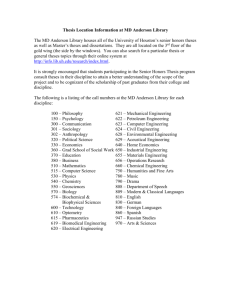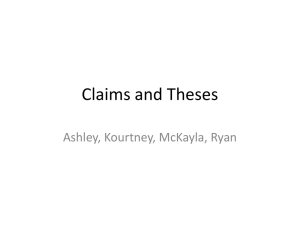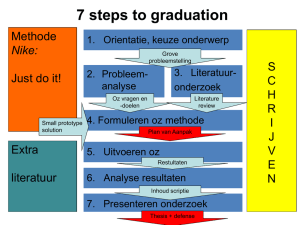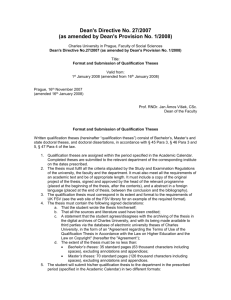Information for students writing a Bachelor Thesis in Economics
advertisement
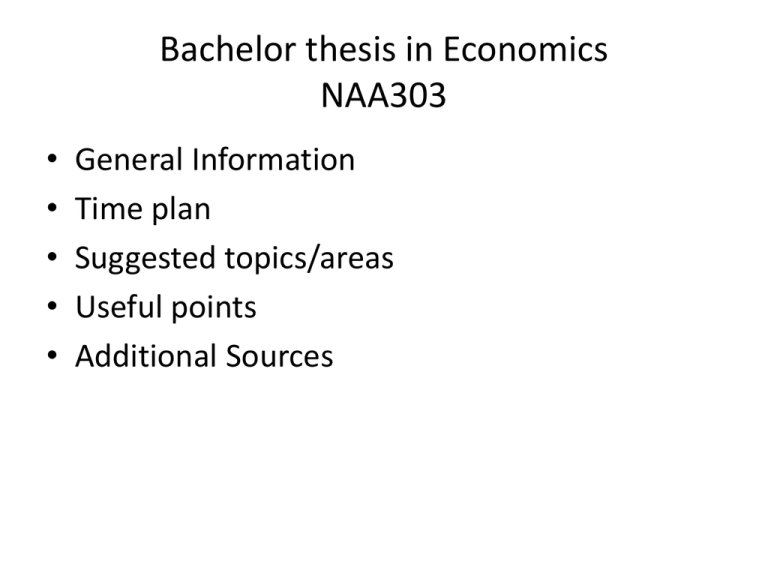
Bachelor thesis in Economics NAA303 • • • • • General Information Time plan Suggested topics/areas Useful points Additional Sources General Information NAA303 • Two students per thesis • Groups work under supervision • The work will be presented and also defended against other groups • Empirical and/or theoretical • Plagiarism will be controlled!!! (http://www.urkund.se/) • Period: early April-early June Time Plan NAA303 • February - March: Data and literature searching (Library); dates are not decided yet (1 hour for all students, max 15-20 students) • Febr 16: Methodology seminar (R1-302, 14-16) • March 30: Obligatory meeting (R1-302, 14-16) • By April 9: Groups should deliver a short paper (4-5 pages) to their supervisor and discuss it. Provided that it is accepted, they will continue. If students feel comfortable about their subject, and in order to save time, they should try to collect data (if they need), order books & articles, and start thinking about the aim, the limitations and the methods they plan to do. Time Plan NAA303 • April- early May: Groups work hard with their thesis!!! • By early May (w.19): A first draft of at least 2/3 of the theses should be clear, and discussed individually with the supervisor. Bad work will be stopped at this stage. • May 27-28: All groups are responsible to controll their theses for plagiarism! Discussion groups should be decided and all groups are informed. • May 29: (before lunch!!!) All groups must send their theses to everyone else. Time Plan NAA303 • Final seminars: June 3 (9 -16 preliminary) • At the latest, 7-8 days after the final seminars, students correct all remaining mistakes and formalia and send their corrected thesis to the department; otherwise they will not be credited with points!!! • A writen opposition should be sent to the examinators as well. • Theses which need more time should be reworked during the summer and graded in August/September. Suggested topics/areas NAA303 • • • • • • • Labour Economics Macroeconomics Microeconomics Industrial Economics Finance/Investments Environmental Economics Economic Growth Suggested topics/areas NAA303 • • • • Theses either theoretical, empirical (econometric) or both Even a very good (and recent) review of a topic Length ?: Fonts 12; double space If it is a recent, critical review of a topic, about 18-20 pages of Pure Text, with very few formulas and no Tables or Graphs, which are equivalent to 30 lines of pure text • With a few own Tables and/or Graphs, about 25 pages; with ”borrowed” Tables or Graphs, about 30 pages • With most formal styling (i.e. using higher Maths preferably from non-textbooks) approximately 15 pages. • If you have many Tables and Graphs you can put them in Appendix (does not count). But, upper limit, inclusive Appendix and References is 40 pages! Useful points NAA303 • Check old bachelor theses. • Use the Internet to find articles, data and other relevant information. • You are supposed to find extra material, from more ”scientific” journals or books, and avoid ”newspapers”, or ”unknown” sites. • Explain the difficult parts, but not ”easy” or ”basic” economic arguments. Give good references of standard books instead for ”easy” parts. • BE HONEST & CAREFUL WITH PLAGIARISM! Useful points NAA303 • State the AIM of the thesis and concentrate on that!!! NOT MANY AIMS or OBJECTIVES!!! • Be aware of the limitations of the thesis and all implicit or explicit assumptions or conditions you need. • Be consistent with your arguments. • Come back to the aim of your thesis and ask yourselves if you achieved what you have promised to do! • Remember that you do not write for yourselves, but for others, who have approximately the same knowledge and backround. Try to express the arguments, the analysis, the method etc as clear as possible! Additional Sources NAA303 • The Harvard System of References http://www.lisa.sbu.ac.uk/helpsheets/hs 30.pdf, or http://www.lc.unsw.edu.au/onlib/ref.ht ml • Use an elegant style, number all Tables, Graphs and Pages consistently. • How to test for plagiarism http://www.urkund.se/, or Google! Evaluation NAA303 • All ECTS marks apply. • The final mark is weighted by at least 80% of the Thesis itself, by at most 10% of its presentation and defence and by at most 10% of the discussion of another thesis and active participation in all seminars. • Notice that the version presented during the final seminar counts. Moreover, no marks will be given, unless a final improved and corrected version has been sent to the supervisor/examinator.
